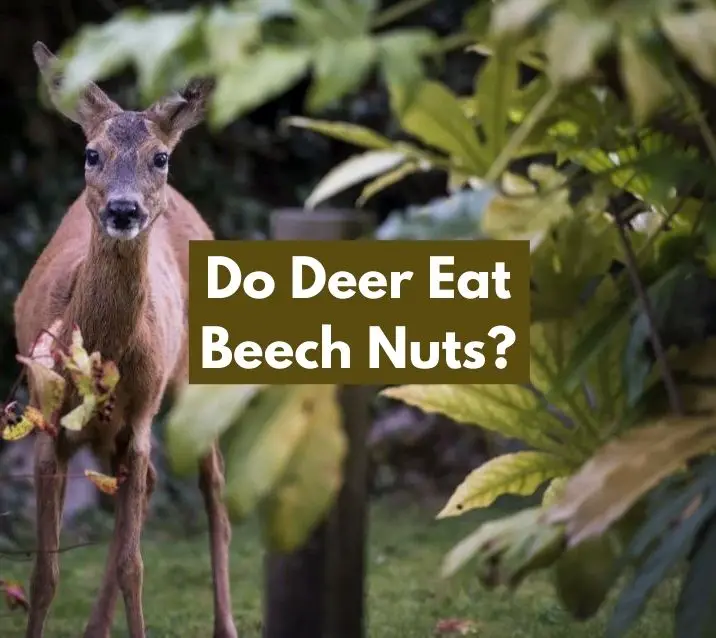There are a lot of myths out there about what deer do and do not eat. One common question is: do deer eat beech nuts?
Deer love to eat beech nuts because of their taste and easy access. While beech nuts are not a common part of a deer’s diet, they provide vitamins, fat, and protein which provide plenty of nutrition.
There’s a bit more to learn about deer eating beech nuts which we’ll cover in today’s guide. Read on for more info.
Why Do Deer Eat Beech Nuts?
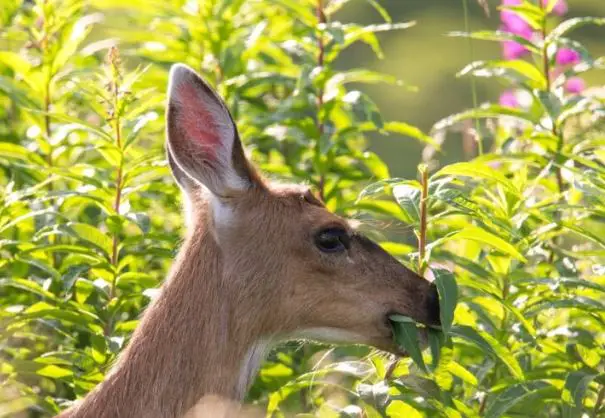
Deer love to eat beech nuts because they like the taste and they fall on the ground, so they’re easy to get at.
Why is this?
Beech Nuts are very sweet and don’t have bitter tannins like acorns or other nuts do, so deer greatly prefer them.
The same goes for beech nuts sprouts from stumps and their seedlings.
Deer feed on beech nuts usually between autumn and winter
During winter months, deer may eat the twigs, bark, and leaves off of beech trees as well.
Additionally, deer will consume a wide variety of foods like beech nuts based on opportunity.
In fact, some folks specifically choose to grow beech trees near their food plots to attract deer.
If you’re not convinced, leave some beech nuts out for deer to eat (or plant a beech nuts tree), and wait to see what happens!
Do Deer Eat Beech Trees?
Deer love browsing leafy greens, including those found on beech nuts bushes.
Deer will happily eat the shoots, twigs, and leaves from beech nuts bushes, so it’s important to take steps to protect your bushes if that’s a concern for you.
How Do I Keep Deer From Eating My Beech Trees?
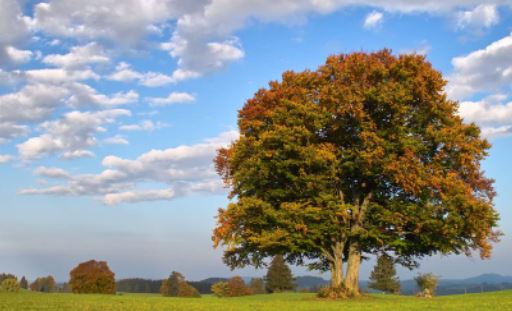
Most people who are asking do deer like beech nuts are trying to find ways to attract them.
If you’re the opposite and looking to keep deer away, this next section is for you.
There are a few things to keep in mind when you’re protecting beech trees from hungry deer: their habits, your scent, repellent options, and when you plant them.
Deer will eat nearly anything if they’re hungry enough, so your main goal is making your garden as least inviting to deer as possible.
Check out our guide on how to keep deer from eating plants where we cover 25 quick and easy tips for keeping hungry deer out of your garden.
Use Bud Caps On Your Beech Trees
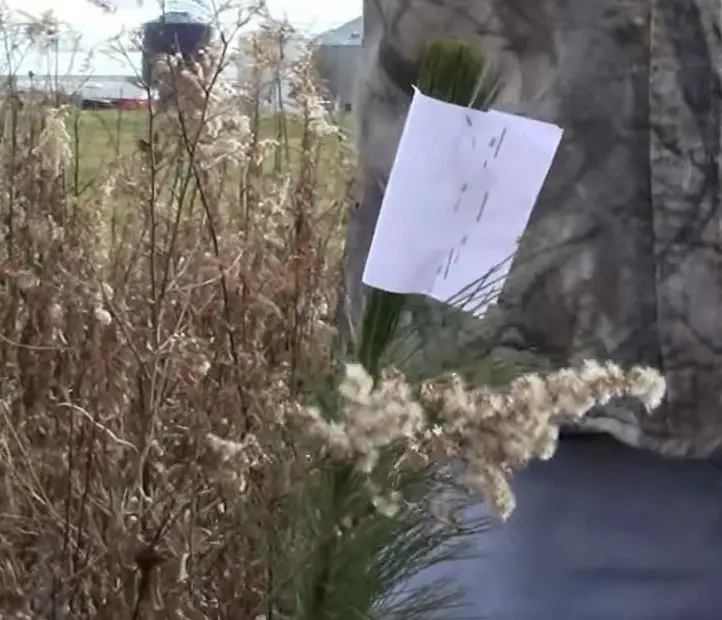
Bud caps are just 4” x 6” pieces of paper folded in half that you staple around the bud and terminal shoot of your young beech nuts trees.
Use about two to three staples on each side of the paper to hold it in place.
Deer will be discouraged from munching on the beech nuts buds thanks to the bud caps in their way.
You can spray homemade deer repellent or mint spray on these bud caps for an added layer of protection.
Will My Beech Trees Grow Back After Deer Eat Them?
Fortunately most beech trees can survive deer browsing, and will grow back to good health in a few years.
Consider using one of the preventative options we outlined above to prevent damage done to them by deer.
Are Beech Nuts Good For Deer?
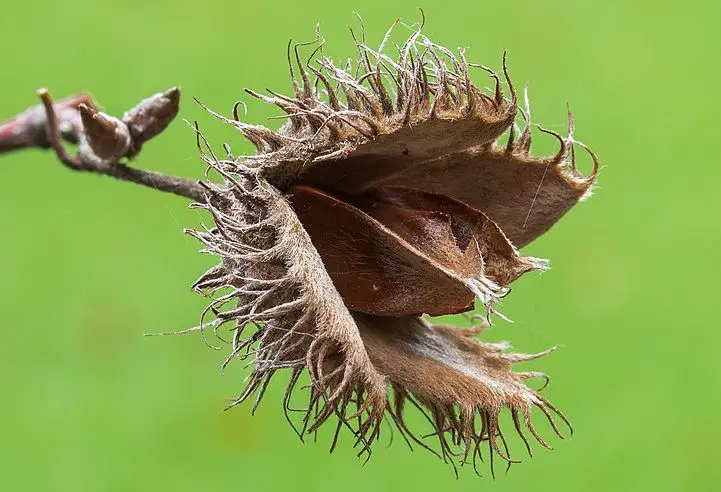
When deer eat beech nuts it provides them with a good blend of protein, fat, carbohydrates, and fiber, along with the following vitamins and minerals:
- B Vitamins
- Iron
- Copper
- Potassium
- Manganese
These vitamins and minerals provide deer with many benefits.
Potassium is great for deer because it helps maintain good pH balance and aid in proper digestion.
Manganese assists deer in growth, respiration, and reproduction.
Fat-Soluble Vitamins For Deer
Vitamins A, D, E, K, and calcium are fat-soluble, so they can be stored in the deer’s fat and liver to be used later as needed.
This means that vitamin A content from deer eating beech nuts can be “stored up” for later use, which is highly beneficial.
Water-Soluble Vitamins For Deer
Vitamin C, B Vitamins, niacin, folic acid, and potassium are all water-soluble, which means they cannot be stored, so they must be replaced continually.
So a deer that eats beech nuts for the potassium content must continue to consume foods that contain these necessary vitamins to stay healthy.
How To Feed Deer Beech Nuts
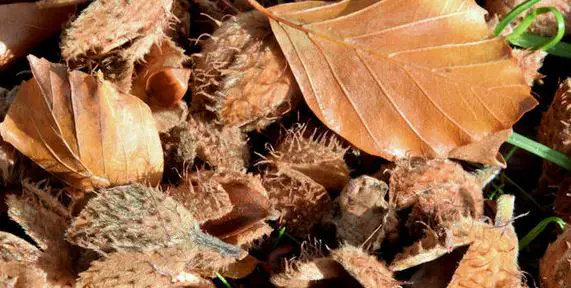
There are a few things to keep in mind when feeding deer beech nuts: the size of the portion, your scent, and how many deer you’re feeding.
Make sure to place the beech nuts on the ground where they’re visible and can be easily reached by deer.
If you’ve got a beech tree, the nuts will naturally fall on the ground and the deer will eat them, usually after all other food resources have been depleted.
If deer are not normally around your area in winter, don’t feed them beech nuts leading up to winter as they will not migrate where and when they should.
This will lead to the deer relying on you as their food source and can result in starvation.
Should I Shell Beech Nuts For Deer To Eat?
Chances are that it’s not worth it for you to spend time specifically shelling beech nuts for deer.
You could leave your scent on them, plus the deer’s teeth are designed to be able to eat food (or crack shells open) for food that’s best for them.
Don’t Leave Your Scent On Deer Food
Deer have a keen sense of smell that allows them to smell human scent farther than bloodhounds can, and can smell up to six different scents at once.
Deer won’t eat food like beech nuts if they have a strong human scent on them, so you should take care to minimize your trace.
You can do this by rinsing the beech nuts and also washing your hands with antimicrobial soap.
Alternatively, you can put a few drops of apple cider vinegar on your hands when handling food you’ll be giving to the deer.
Another easy option is to use gloves when handling beech nuts for deer to eat.
Consider The Amount Of Deer You’re Feeding
If you have lots of deer in your area, think twice about putting out food continuously for them.
If you bring deer together at the same feeding site, it can increase their risk of contracting chronic wasting disease or other communicable diseases from each other.
Can Deer Eat Beech Nuts? Wrapping Things Up
So, do deer eat beech nuts?
The answer is yes.
Deer will consume beech nuts whenever they can because they’re tasty, contain loads of fat and protein, and they benefit from the vitamins and minerals found in them.
Have any observations to add to the discussion? Be sure to let us know in the comments below.
Check our our other helpful deer food guides while you’re here:

